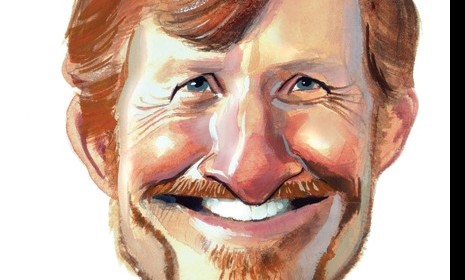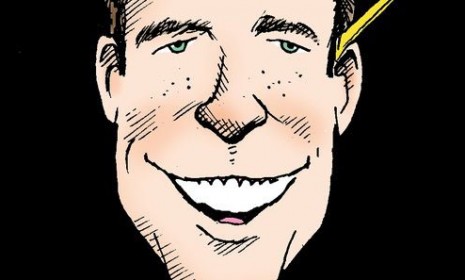Issue of the week: What does Comcast see in NBC?
By acquiring control of NBC Universal, Comcast would get Universal Pictures, the NBC broadcast network, 10 local TV stations, programming franchises like Law & Order, and a collection of cable channels including MSNB
A free daily email with the biggest news stories of the day – and the best features from TheWeek.com
You are now subscribed
Your newsletter sign-up was successful
Last year, General Electric CEO Jeff Immelt said he had no plans to sell NBC Universal, the conglomerate’s media and entertainment unit, said Cynthia Littleton in Variety.com. Apparently, he’s changed his mind. GE is now negotiating to sell a majority stake in NBC Universal to Comcast, the largest U.S. cable operator. Comcast Chairman Brian Roberts, who in 2004 mounted an unsuccessful $54 billion bid for Disney, “has made no secret of his interest in getting deeper into showbiz.” By acquiring control of NBC Universal, Comcast would get Universal Pictures, the NBC broadcast network, 10 local TV stations, hit programming franchises like Law & Order, and a “strong portfolio of cable channels,” including MSNBC, USA, and the Weather Channel. GE, for its part, would limit its exposure to a business that’s been struggling of late and that has never meshed well with the conglomerate’s core industrial holdings.
To gain its prize, however, Comcast would have to pull off a complex “chain of deals and agreements,” said Evan Hessel in Forbes.com. The first step is to convince Vivendi, the French media conglomerate that owns 20 percent of NBC Universal, to sell its stake. Then Comcast and GE would form a new company consisting of NBC Universal’s assets and the cable channels that Comcast already owns, including E! and Versus. Comcast would pay GE a “hefty” $6 billion or so for 51 percent of the new company. The arrangement would need the blessing of the Federal Communications Commission, which “may be inclined to fight” a deal that would concentrate so many valuable properties under a single corporate umbrella. And finally, GE and Comcast would “have to convince their shareholders of the value of connecting a content company with an entertainment distributor, an idea that has fallen out of favor in recent years.”
There’s a reason the approach is out of favor, said Andrew Leonard in Salon.com. Why combine good content with a distribution system that’s rapidly becoming obsolete? For a growing segment of the population, “the computer is the primary window on the entertainment universe.” In my own household, for instance, we no longer have cable or even a TV, and nobody, including my kids, feels deprived. “They’ve got more
The Week
Escape your echo chamber. Get the facts behind the news, plus analysis from multiple perspectives.

Sign up for The Week's Free Newsletters
From our morning news briefing to a weekly Good News Newsletter, get the best of The Week delivered directly to your inbox.
From our morning news briefing to a weekly Good News Newsletter, get the best of The Week delivered directly to your inbox.
content options on the Net now than they know what to do with.” No matter how many channels Comcast buys, it can’t slow “the steady flow of eyeballs to online video.”
Actually, buying NBC Universal is Comcast’s way of confronting the digital threat, said Kelly Riddell and Sarah Rabil in Bloomberg.com. NBC, don’t forget, is a co-owner of Hulu.com, a website that streams TV shows and movies. Hulu.com might soon be eclipsed by other vehicles for delivering digital content, but the point is that NBC Universal is already preparing for a future without cable. Comcast’s Roberts wants to buy into that effort, to gain “a bigger voice in content distribution.” Beyond the business imperatives, it’s also a matter of family pride. His father started Comcast in 1963 as a five-channel cable system in Tupelo, Miss. Roberts is determined not to oversee its demise.
A free daily email with the biggest news stories of the day – and the best features from TheWeek.com
-
 The Olympic timekeepers keeping the Games on track
The Olympic timekeepers keeping the Games on trackUnder the Radar Swiss watchmaking giant Omega has been at the finish line of every Olympic Games for nearly 100 years
-
 Will increasing tensions with Iran boil over into war?
Will increasing tensions with Iran boil over into war?Today’s Big Question President Donald Trump has recently been threatening the country
-
 Corruption: The spy sheikh and the president
Corruption: The spy sheikh and the presidentFeature Trump is at the center of another scandal
-
Issue of the week: Who killed the Twinkie?
feature The seemingly imperishable Twinkie has finally met its match, and its name is Big Labor.
-
Issue of the week: Apple’s patent victory over Samsung
feature Apple's “sweeping victory” is among the biggest intellectual-property triumphs on record.
-
Issue of the week: Goldman Sachs’s ‘toxic’ culture
feature Greg Smith’s stinging public resignation from Goldman Sachs landed on Wall Street “like a bomb.”
-
Issue of the week: Can a mortgage deal revive housing?
feature Five big banks reached a settlement with state and federal officials to pay $26 billion to offset some of the damage caused by their misdeeds in the foreclosure crisis.
-
Issue of the week: Europe gets downgraded
feature Standard & Poor's lowered the credit rating for nine European nations, indicating that Europe has not yet convincingly dealt with the debt crisis.
-
 Tom Toles: Cartoonist of the Year
Tom Toles: Cartoonist of the Yearfeature Meet the winner of The Week's Cartoonist of the Year award
-
 Cartoonist of the Year finalists
Cartoonist of the Year finalistsfeature A brief look at this year's nominees
-
Issue of the week: Calling out the crash’s culprits
feature The Senate's Permanent Subcommittee on Investigations has just published its 635-page report on the financial crisis.